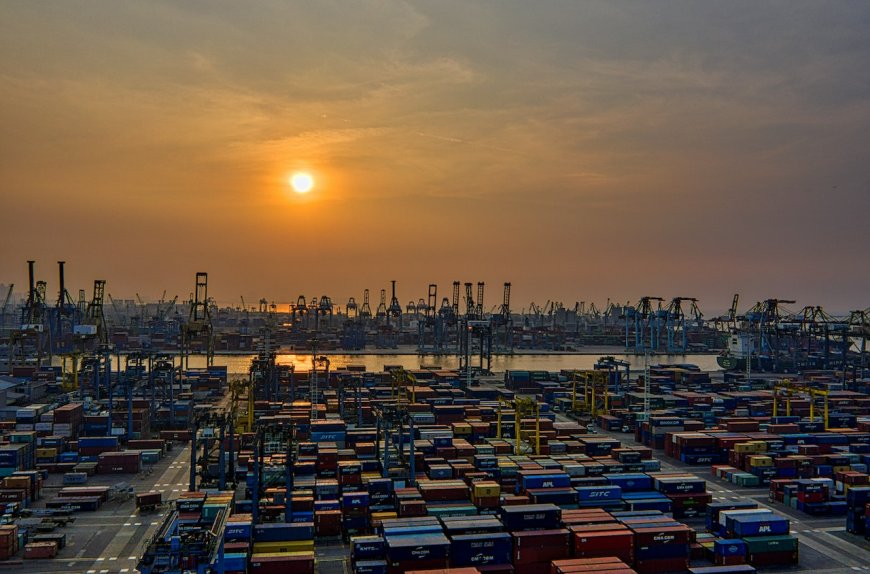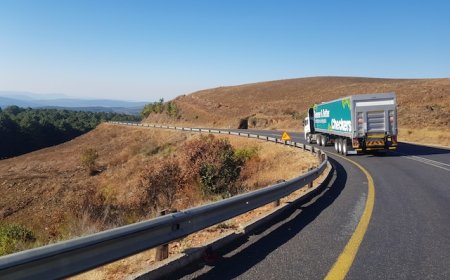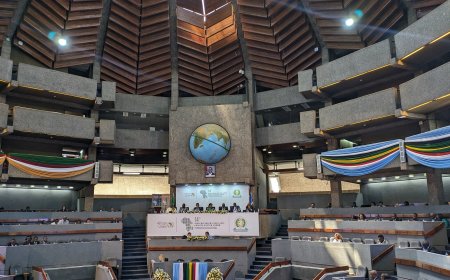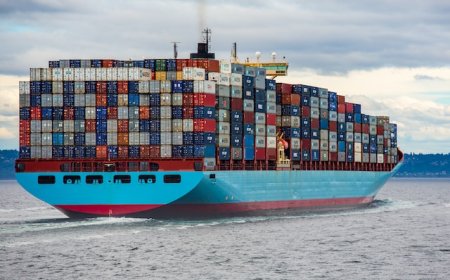The African Continental Free Trade Area (AfCFTA) agreement is now in its implementation stage. The Guided Trade Initiative has seen eight countries trading a list of goods with each other and the initiative is set to be expanded before the end of the year. This increases the urgency of improving trade facilitation measures across the country, including for island nations such as Cape Verde. In this interview, APRI discusses issues around trade facilitation in West Africa, services trade, and broader trade and development issues with Amilcar Monteiro, an expert in trade facilitation from Cape Verde.
The interview was conducted by Teniola Tayo, Trade Policy Fellow at APRI. The transcript has been shortened and the responses have been slightly edited for clarity.
Teniola Tayo
You're from Cape Verde and you have extensive experience in trade and investment issues in the country, both from within the government and outside. We also know that in January 2021, over two years ago, trading under the AfCFTA, or the African Continental Free Trade Area agreement was set to commence. Negotiations are still ongoing, but then an interim trading arrangement was launched last October, called the Guided Trade Initiative, where around eight countries are already trading under the AfCFTA ecosystem. What can you tell us about the state of things in an island country like Cape Verde, as well as the country's level of interest and readiness to trade under the AfCFTA?
Amilcar Monteiro
I would say to start that Cape Verde is an ECOWAS member, and it has fully ratified the AfCFTA. So I think the political leaders understand the vision, but I don't know if they understand the challenge. As an island country, we should have more connections with the region in order to increase the trade within West Africa and Africa. But so far, our trade with Africa has low volumes. We don't export much to the continent, and Africa is less than 1% of our overall trade. I would say we need to start with regional integration. The AfCFTA brings the vision, but we need to consolidate regional integration in order to take advantage of the instruments that it provides. I agree that the agreement is creating a new horizon for African countries and providing enabling instruments that will allow African countries trade with each other. There are a lot of opportunities but without transport - both maritime transport and air transport - without free movement of capital within the region, it will be very hard to transform the current status of things.
Teniola Tayo
Would you say in general that the current government of Cape Verde, the public service and to some extent the people are interested in integrating more within Africa? This links to my second question, on regional integration and regional value chains from the perspective of a country like Cape Verde. You mentioned that Cape Verde's trade with Africa is low. What do you think is a pathway for Cape Verde to trade more with other African countries? And even beyond that, do you think there's a real interest in becoming a bit less Eurocentric and maybe a bit more Afrocentric?
Amilcar Monteiro
In Cape Verde we have 500,000 people living on nine scattered islands. So it's a very tiny market. Regarding trade statistics, I would add that more than 80% of our trade is with Europe. And it's historically been a trade deficit. Our imports are tenfold higher than our exports. So you see, these numbers reflect a weird trade dynamic. We have legislation to attract foreign investment, so the Spanish invest here in industrial factories to process fish. Under several complex agreements with the European Union, Cape Verde is allowed to export to the EU, and there are some provisions for processing the fish locally before export. These factories are set up to operate between Cape Verde and Europe and not between Cape Verde and Africa, so we will need to have other agreements to establish other kinds of cooperation in order to export to other regions besides Europe. The country is becoming Eurocentric, yes. I think it's the same path that the French-speaking countries in the francophone region are on.
I think trade is so critical that I would say that we need a change of policies internally to make things happen. Because otherwise, what I see now is just intentions - we sign the agreements, we ratify the agreements, but then we don't implement the instruments. For instance, Cape Verde, we have been members of the ECOWAS since 1977, and most of the instruments are ratified. But, for instance, the common external tariff has been implemented by the African countries and Cape Verde doesn't apply the instrument. And I understand that it's not an easy process because the state budget depends on revenue from trade; trade duties and VAT are the main sources of revenue for the government. So to change that, and to apply a new common standard tariff, it's critical. And, besides that, it affects our relations with Portugal and Spain. And so there's a lot of other interests involved that don't allow us to just change the policy, but of course, with a revolutionary government, things could change.
On Cape Verde’s Tourism Industry
Teniola Tayo
Now, still on the topic of Cape Verde, when it comes to trade-in-goods, Cape Verde, like you said, is a very small country (an island state), so there's not a very high volume of goods being exported. Though when you look at trade-in-services, the situation is a lot better. Cape Verde is a beautiful country (like you said, a bunch of different islands linked together), and it does export travel services in the sense that you have lots of tourists coming to Cape Verde to visit. And what we know from the COVID 19 pandemic was that a lot of African countries, and even countries outside Africa that were tourism dependent, suffered because the pandemic led to the closing of borders and a serious decline in international travel. How do you think Cape Verde is recovering from the pandemic? Do you think there's been a lot more conversation and even action towards diversifying away from tourism trade or tourism exports? Also do you think Cape Verde is looking to have an even higher focus on trading services under the AfCFTA?
Amilcar Monteiro
Yes, basically, I see trade as a catalyst, as we talked about previously, so I understand that trading is like a sword with two sides…
Teniola Tayo
A double-edged sword.
Amilcar Monteiro
Yeah, exactly a double-edged sword. So if you don't know how to handle it, you will hurt yourself. And in Cape Verde, of course, our economy is mostly service-based, but I don't believe that's a determinant. Of course, service is more important for us than goods trade. That's a reality. But it's not only about tourism. Cape Verde is located in the corridor of maritime transport between northern and southern Africa to Europe or Africa to America. And you have crossroads of submarine cables with internet signals. So telegraph was passing here before, as we now have the new cable links that connect the different continents. So you have a lot of opportunities. There are more than 3000 ships that cross our borders, or pass nearby every day. And you have all the air traffic between North and South crossing our airspace. So in terms of telecommunication, finance, trading, there's a lot of potential but you cannot grasp onto these without clear strategies. Also, COVID's impact really affected the tourism industry. And so I understood that something needed to happen, which is that the government needed to understand that tourism fluctuation needs to be managed and that we need to lower the dependence on tourism, otherwise the country would face another crisis.
But so far, I don't see any changes, tourism is back, the hotels are full again and this is a global value chain, essentially. For instance, one of the major tour operators with operations in Cape Verde is the TUI group, and they've established large scale operations in the islands, and that has a huge impact, not just because of the traffic of tourists but also because there's consumption in the hotels, and they need to be supplied. And of course, these entities, they're not concerned with our local economy, they are there to make profit, and to make profit, they can't accept shortages of anything. So they have a global value chain operation but are operating in Cape Verde as an enclave. By an enclave I mean, an operation that happens in your territory but has no connection, or minimal connection, with the rest of the country's economy. The local providers cannot supply the hotels, so they don't take any benefits from the operations there.
The pandemic exposed our weaknesses, showed how fragile the country is and how dependent we are on Europe. The issue is, our fragilities demand another approach in terms of trade policies, and of course, we have more opportunities in service. We can develop small industries, we can minimise our dependence on the outside, we can increase our agricultural production, and we can maximise what we produce right now. We can also create a different kind of tourism - if the larger, all inclusive operators are operating in Cape Verde, it's because they see the potential. So Cape Verde can have a diversification policy to attract other kinds of operators and tourists that are more sustainable. For now, I don't think we are on a sustainable path.
On Ghana and ECOWAS
Teniola Tayo
You’ve mentioned ECOWAS, and I'm aware that you just completed a field trip in Ghana, where you collected some data on cross border trade and investments. From your observations and using Ghana as a case study, what are some of the bottlenecks you think we need to fix in west Africa in order to increase trade and economic integration via tools like the AfCFTA, and the ETLS, which is one of the ECOWAS' instruments?
Amilcar Monteiro
Yes, I'm very surprised with the case I found in Ghana. I was ready for the worst-case scenario because the terms of reference that we were working on had a case that trade has a lot of barriers and has a lot of complications. But in Ghana, beyond the investment they made in the port of Tema and the operations they have there, the public private partnership with Meridian, I have a sense that Ghana is an excellent case study.
I went to the border with Togo, Aflao border, and I also had an opportunity to visit the Akanu border in Togo, which is a joint border post. It's part of an initiative of the ECOWAS to establish several joint border posts in the region, and there are seven so far. Of course, things take time to happen, and that's why people mostly don't believe that things have reached the point they are now. The joint border post in Akanu, is one of the best case studies I've seen regarding trade across borders. They are implementing trade facilitation measures, and I could see that they are quite advanced. They have single windows, and I'm most surprised with the tracking system they have there because one of the issues in the continent is that, in the corridors, there is opportunity for all sorts of bad things to happen because there's usually no control. There's a lot of smuggling, and other negative things happening that authorities need to enforce rules against. Otherwise, there can be no secure trade because trade facilitation is there for legitimate trade. And of course, that creates a lot of requirements, and these requirements establish a threshold. If you are in the informal sector, it will be difficult to take advantage of these instruments because trade is a formal activity. So the informal sector is constrained a lot by the rules that are in place, but the formal sector can take advantage of what it has in place. So the single windows enable a risk management system that does the pre-trial of the manifests.
Teniola Tayo
That means we have a lot to learn when it comes to trade facilitation from Ghana. So things are advancing when it comes to digital trade facilitation; like you said, the electronic monitoring of cargoes. And then one of my last questions...
Amilcar Monteiro
Before you go to the last question, I didn't quite complete my response. You talk about bottlenecks, (and we need to see things as a value chain between the registration and the trade operations in the borders) so where are the bottlenecks? In Ghana, they're not in the borders. They may be in the corridors, but in 2021, the government of Ghana removed the toll booths. Previously there were toll booths along the road, and the vehicles needed to pay different kinds of fees; whether a truck, motorcycle or car, you needed to pay some small fees to go along the road, and you would find a lot of these toll booths. The government decided in 2021 to remove them; they are not there anymore. So we saw that the transit in the corridor was fluid: no cargo jams, no blockages, it was happening. When we started going back in this value chain, to the registration office, we found a critical situation where of course, you can easily create or register a business in Ghana, but that was only for Ghanians. If you are a foreigner, even if you are from an ECOWAS member country, the minimum amount of capital for you to establish an operation is $500,000. And if you want to partner with a local Ghanaian, it lowers to $200,000, from your side. On the Ghanaian's side, if he wants to have a 50-50 business with you, he needs to bring $200,000 as well. So I think this is one of the greatest causes of concern. One of the greatest barriers we have in the region is that we don't have a special regulation to enable business in the region. Of course, we can move around, and I went around in Ghana. I just presented my passport, and in the beginning the official didn't know where Cape Verde was, but he called his boss, and his boss said "He's from Cape Verde, a citizen from a member country so he's allowed to enter without a visa". Of course, that happened when I went to Nigeria, and even in Senegal, it happens sometimes; and I know you have a problem with...
Teniola Tayo
Even in Senegal? in Senegal they didn't know where Cape Verde was?
Amilcar Monteiro
No, in Senegal, they knew where Cape Verde was, but at times the officials tried to demand a visa. They didn't know that you are allowed to enter without a visa. Sometimes it's an official that is new there: he didn't receive proper training, or he didn't work in this border with Cape Verde, so he may not have been aware. But in Ghana, it happened again. And I was surprised because I was hoping that Cape Verde was well known in the region, but it's not. So these are the issues that we have in place, and of course, one of the key issues, not really with Cape Verde but with the neighbouring countries between Cote d'Ivoire, Ghana, Togo, and Nigeria, is that these countries have mostly similar economies. So they compete with each other, and they don't trade much because their base operations are quite similar. Thus it’s difficult for them to integrate, but if you allow people from Nigeria, from Benin, to establish operations to create business, in other countries it will facilitate things and create more trust because now I think even ECOWAS has done a great job with the ETLS, which is now decentralised (that’s one of the findings). When I was the Director General for Industry and Trade, you'd need to submit the application for the registration of products under the scheme, to Abuja. It took a lot of time, and it was all paper based. And sometimes the member countries didn't know that a product was already registered because the information didn't get to them. So for instance, a company tried to export bottled water to Guinea Bissau and the product was registered, the rules of origin were met, and everything was in place. But when they arrived with the product in Guinea Bissau, the customs there didn't recognise the product as an ECOWAS product. They lost money because of that, and they didn't do a second trial because they didn't trust that the scheme would be recognised. But now, it's decentralised.
In Ghana, all the registrations are done in Accra, and the information is in the single windows. So when you arrive with your cargo, it's recognised immediately, and the bureaucracy is much lower now. The second issue is about the informal traders. People have a lot of concerns about allowing people to do trade across borders, especially the small informal operators, but this is critical, because we can see this as a problem or as an effect. I understand this as an effect because we did a trial (a simulation) of how much a small cargo of rice and palm oil would pay to the customs. So these two items were evaluated according to the rules they have there, and they reached a valuation of $200. Then they applied the duties, and the final amount to pay was around $150. You can see it's more than 30% of the value of the goods, and the valuation is using the same reference they use for container goods. So these people are informal traders, they go to Benin, and they buy rice (around 50-100 kilos of rice), and they bring it to the border and they pay more than 30% over the valuation that's established in the system. And this valuation was set for larger cargo, not for smaller cargo. This implies that the small traders are paying a lot more, and they're paying a different value from the value of the rice they bought in Benin.
On Trade and Development
Teniola Tayo
For the closing statement, something that you already mentioned, which is the issue of trade as a catalyst for African development in general. We were having a conversation just before we started the interview, and you mentioned how there's a lot of focus on trade policies at the moment, but that it's just one out of a bunch of other things that need to be done towards African development. So maybe in a few minutes, like two or three minutes, you can summarise some of your thoughts on this particular issue, on trade as a catalyst for African development, or some of the other things that we ought to be paying equal attention to, to really get to where we're trying to go.
Amilcar Monteiro
Trade is so critical. Sometime in the past, in the 90s, they established a policy here in Cape Verde to favour carpenters, and so they raised the taxes for the importation of furniture. Now it’s very expensive, and no one’s reviewed the laws till now. So you have these strange effects of trade that people don’t understand. Why is all this happening? It’s because trade policies must be tuned; you need to tune every instrument periodically. You should not create a legislation and leave it there for 20 years because, when things change, your legislation (which is what determines how trade is implemented) then creates a lot of barriers and constraints that don’t allow new ideas and opportunities to be brought to the table. So trade must be implemented in the best way possible (what you see in China and in the WTO), where you have commissions established to tackle specific issues, that follow what’s happening on the global front and adjust things on the inside to create more opportunities. Trade is strategy; it’s your reality vs what you want to develop, basically it’s “this is the scenario, how are you going to change it”. These are the fundamentals. You need to have people (internally) with clear knowledge on different aspects of trade, from goods to intellectual property, capital, communication, rules of origin; these are all special areas, and if you don’t have specialists to work on these areas, you’ll keep losing track.
To finalise, one of the things that I noticed is that, in my region here in Cape Verde, we’re surrounded by the poorest countries in the world, and we’re all countries that have insignificant participation in global trade, and like I said we’re the poorest ones, so is this a coincidence? I don’t think this is a coincidence; this is just a lack of knowledge on trade. When we look on the other side, at China, it’s not only the most robust country in terms of trade, it has a structure in place that makes trade work as a catalyst. We saw what happened with China. China 20 years ago was a developing country, and now is now one of the most advanced countries in the world. What happened there? I think it’s about the knowledge they developed around trade, which allowed them to create the free zones and trade corridors, where they create investment opportunities. My idea is that we need to foster our knowledge and our laws to be more adapted to current realities and to take advantage of what we have. In Nigeria, for instance, you have a strong movie industry, but if you want to go to the global stage and disrupt things, you need to be better at intellectual property, and while Africa is using the things that are being brought in from China, we could be transforming our traditional products that are not in the custom codes. The rules of origin don’t apply to several products that are produced in Africa, and once you want to support them, they aren’t recognized. For instance, you have Grogue - it’s a liquor produced in Cape Verde predates the production of rum in South America. But we don't have intellectual property around its production, and this has kept us from expanding the industry.
So, I hope my conversation was sufficiently clear to respond to your questions.
Teniola Tayo
Yes, absolutely. Thank you so much Amilcar for taking the time for this interview.
About the Expert
Amilcar Monteiro
Amilcar Monteiro is a highly qualified team leader and project manager with a distinguished professional career in Cabo Verde and a deep understanding of trade policy development and institutional capacity building. Throughout his career, he has held significant positions, including Director-General for Industry and Trade in the Ministry of Economy and Employment and Executive Director at the Chamber of Commerce of Sotavento in Cabo Verde. On Trade, Amilcar played a key role in formulating the "Trade Facilitation Strategy and Single Window Development Plan," which involved conducting a TFA Gap Analysis with the members of the National Trade Facilitation Committee. His current research interests focus on non-tariff barriers impacting MSMEs trade operations in Ghana.




